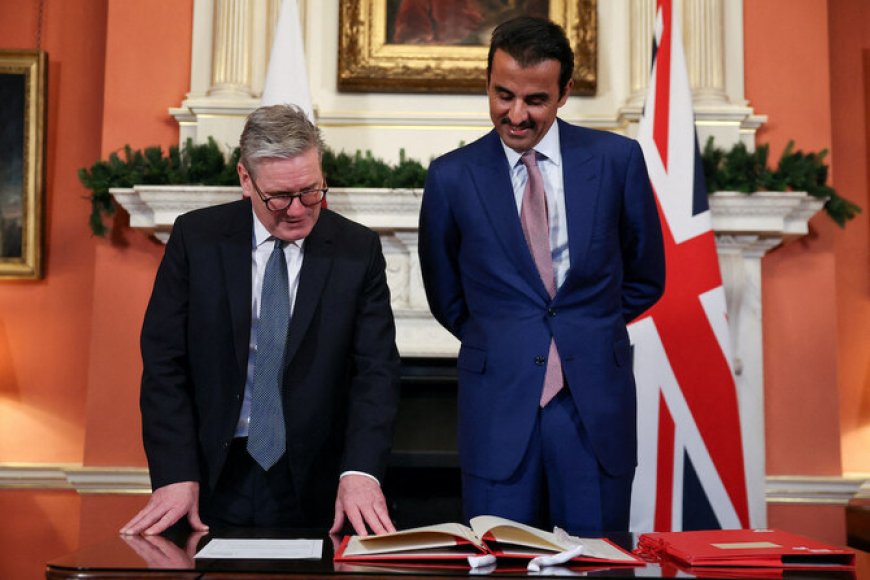From Doha to London: Qatar's Ties with the UK Amid Long-Standing Rivalries with Saudi Arabia
Qatar--a tiny peninsula nation located on the southern coast of the Persian Gulf—seeks to portray itself as a linchpin of diplomacy and conflict resolution and continues its relentless pursuit of geopolitical ascendancy. The small yet ambitious emirate projects an image of an indispensable mediator in regional crises leveraging its resources and strategic alliances to gain traction on the global stage. Central to its strategy is the cultivation of ties with influential powers with Britain emerging as a critical partner in this intricate web of international relations. The recent state visit by Qatar's Emir to London exemplifies this calculated effort as the littoral Persian Gulf state seeks to deepen its engagement with the United Kingdom across a spectrum of sectors.

By: A. Mahdavi
Qatar--a tiny peninsula nation located on the southern coast of the Persian Gulf—seeks to portray itself as a linchpin of diplomacy and conflict resolution and continues its relentless pursuit of geopolitical ascendancy. The small yet ambitious emirate projects an image of an indispensable mediator in regional crises leveraging its resources and strategic alliances to gain traction on the global stage. Central to its strategy is the cultivation of ties with influential powers with Britain emerging as a critical partner in this intricate web of international relations. The recent state visit by Qatar's Emir to London exemplifies this calculated effort as the littoral Persian Gulf state seeks to deepen its engagement with the United Kingdom across a spectrum of sectors.
This courtship of Britain aligns with Qatar's broader regional maneuvering particularly its ongoing rivalry with Saudi Arabia. Despite a veneer of cooperation and the avoidance of overt hostilities the two Persian Gulf heavyweights are locked in a high-stakes competition for regional primacy. Both states acutely aware of their geopolitical heft and the strategic value of their alliances with global powers such as the United States Britain France and China have opted for a strategy of calibrated rivalry rather than outright confrontation. This uneasy détente enables both nations to vie for influence without triggering destabilizing conflicts while subtly undermining each other’s regional agendas.
Qatar; however, seems particularly adept at turning global crises into opportunities for its own advancement. Its role as a mediator in Afghanistan and more recently in the Gaza conflict has bolstered its reputation as a capable problem-solver on the world stage. At the same time the Russia-Ukraine war allowed Qatar to secure a foothold in Europe's energy market positioning itself as a reliable supplier of liquefied natural gas [LNG].
By leveraging its energy resources Doha has simultaneously challenged U.S. dominance in the European gas market and cemented its ties with key European players. Recognizing the enduring importance of Britain as a transatlantic balancer Qatar has been actively strengthening bilateral relations with London since 2021 forging strategic agreements spanning investment education defense and renewable energy.
These overtures have borne significant fruit. The Emir’s most recent visit to Britain was marked by a grand reception underscoring the burgeoning partnership between the two nations. High-profile meetings culminated in agreements valued at over £6 billion signaling a deepening alignment on shared interests such as Yemen- Libya- Afghanistan and Palestine. Qatar’s $1 billion investment in green technology startups further illustrates its effort to cultivate an image as a forward-looking environmentally responsible actor—a narrative that conveniently masks the emirate’s underlying power-driven motives.
Yet beneath this polished facade of collaboration lies a more calculated reality. Qatar’s strategy is not merely about mutual benefit but about solidifying its leverage over key global powers. By embedding itself in Britain’s economic framework and presenting itself as an indispensable ally-- Qatar ensures a level of dependence that can be wielded to bolster its regional clout. These investments are as much about securing influence as they are about fostering genuine partnerships with Qatar astutely positioning itself as an indispensable player in an increasingly multipolar world.
While Qatar's outward narrative speaks of progress cooperation and diplomacy its actions suggest a far more pragmatic and self-serving agenda. In its quest to outmaneuver Saudi Arabia and assert its hegemony within the Persian Gulf; Doha’s moves appear less like the gestures of a benevolent mediator and more like the calculated maneuvers of a nation seeking to entrench itself as a pivotal--albeit enigmatic--regional power. As Qatar continues to intertwine its interests with those of global superpowers it reveals a state whose ambitions extend far beyond its small geographical footprint raising questions about the true nature of its role in the volatile chessboard of Middle Eastern geopolitics.













































